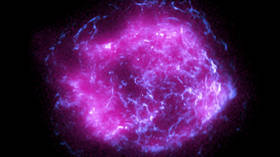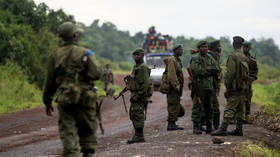NASA unveils first image from newly launched satellite

US space agency NASA has released the first picture captured by its new Imaging X-ray Polarimetry Explorer (IXPE), which launched in December to explore and uncover more about black holes.
The arresting depiction of the remains of the supernova Cassiopeia A, situated some 11,000 light years from Earth, was sent by the satellite back to NASA, the agency revealed on Monday. The celestial object consists of the leftovers of a star that exploded in the 17th century.
IXPE was overlaid on one previously taken by NASA’s Chandra X-Ray Observatory, providing “never-before-seen information about Cassiopeia A,” according to NASA scientists. “The IXPE image of Cassiopeia A is as historic as the Chandra image of the same supernova remnant,” Martin C. Weisskopf, the IXPE principal investigator based at NASA’s Marshall Space Flight Center, said of the new release.
The data provided by the new satellite allows scientists to see “for the first time how the amount of polarization varies across the supernova remnant,” allowing the research team to create the first-ever X-ray polarization map of the object, NASA stated.
Currently orbiting our planet at some 600 kilometers (370 miles) above the equator, IXPE is a collaboration between NASA and the Italian Space Agency, and involves scientists from a dozen countries.












